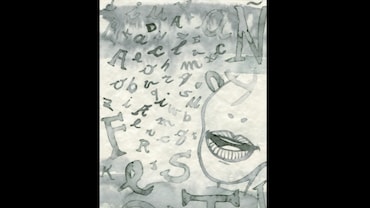- HOME
- /
- Conversations
- /
- Interviews
- /
A Candid Talk With Dan Brown
This bestselling author was in India in 2014

He is currently writing his seventh book, another thriller featuring his code-breaking "symbologist" Robert Langdon. Brown's novels have sold more than 200 million copies worldwide. In Delhi for a lecture, the 50-year-old US writer spoke about his work and on the conflict between science and religion. Excerpts:
Welcome back to India.
It has been a long time. I was in India when I was 19 as part of the Amherst College's men's choir. We toured about 13 countries and sang at the Kamani Auditorium in New Delhi. We also sang India's national anthem but I couldn't, for the life of me, remember it. So I had a taxi driver sing it for me the other night.
When did you start writing?
When I was five, I dictated a story to my mother, who wrote it down and bound it. That was my first book and I still have it. But I realized I wanted to be thriller writer much later. It wasn't until I was out of college and found a Sidney Sheldon novel on the beach in Tahiti that I decided. It was fun, light and fast, sort of adult Hardy Boys. I thought this is the kind of writing I could do.
Briefy explain these elements in your books.
- Codes: I like the concept of secrets hidden in plain sight. A code is like the screen that stands between you and the truth. So much of the world is like that. I think the Scripture is a code, possibly the greatest code. The problem with religion is that it reads metaphorical stories as facts.
- A 24-hour time frame: I like books that move quickly. If I can't say a story in 24 hours then I think I am being lazy.
- Strewing your books with italics: That is interior monologue. It is a way for the reader to get into the head of the characters.
- Langdon, his brainy Bond: I am interested in a hero that is more like an everyday man, one who escapes difficult situations with his mind rather than his gun. He is the person I would have liked to be.
- Strong women: I am surrounded by strong women—my wife, my mother and my agent. They are great role models. I find powerful women very attractive.
- Fast planes: I am fascinated with technology and every little boy dreams of flying. Those two have come together. And if I need to get something done in 24 hours, I better have fast planes.
Did the reaction of the Vatican to The Da Vinci Code surprise you?
Yes, absolutely. These books are fiction. I don't proclaim to have the correct answers. In the novel, I asked the question: what if Jesus were not the son of God, what if he were just a great man with a wonderful message? I thought that was a fine question to ask. This idea that your saviour is divine, to my way of thinking, separates god from man. I don't like that separation, but the Church likes it because it has become the toll-booth to heaven. They have established themselves between man and god. There is a longing in most of us to bypass that.
There have recently been a lot of books, the latest being The Lost Gospel, that goes against what the Bible says about Jesus.
I truly believe that the Christian gospels have been heavily edited and selected to create a certain mythology, so it is not surprising that a number of other stories about Christ are now coming out.
In many of your books you talk about the great conflict between science and religion.
There is a conflict between religion and science, but there shouldn't be. That is because we take the scriptures literally. Religion is at fault for taking scriptures literally; science is at fault for assuming it can answer every single question.
When do you write?
I write all seven days. I wake up at 4 a.m. and write till 10 or 11 in the morning. I write very slowly. For every one page in a book, there are 10 that I threw out.
Is there a bestseller code that you have cracked?
Not really. My first three books—Digital Fortress, Deception Point and Angels & Demons—sold only 10,000 copies worldwide until The Da Vinci Code became a success.
Will your book win a Booker Prize?
Probably not. The Man Booker Prize is for a very specific kind of book. If my fans buy my books, I don't need a prize.






